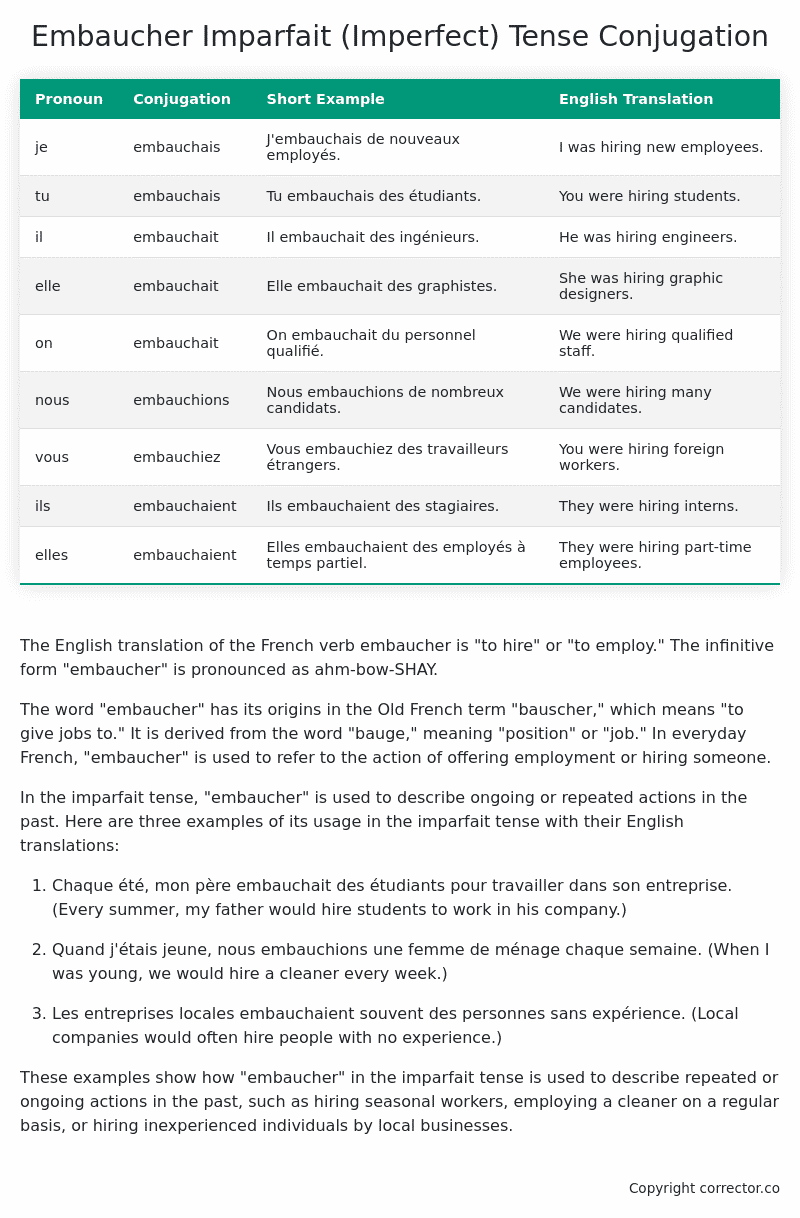Imparfait (Imperfect) Tense Conjugation of the French Verb embaucher
Introduction to the verb embaucher
The English translation of the French verb embaucher is “to hire” or “to employ.” The infinitive form “embaucher” is pronounced as ahm-bow-SHAY.
The word “embaucher” has its origins in the Old French term “bauscher,” which means “to give jobs to.” It is derived from the word “bauge,” meaning “position” or “job.” In everyday French, “embaucher” is used to refer to the action of offering employment or hiring someone.
In the imparfait tense, “embaucher” is used to describe ongoing or repeated actions in the past. Here are three examples of its usage in the imparfait tense with their English translations:
-
Chaque été, mon père embauchait des étudiants pour travailler dans son entreprise.
(Every summer, my father would hire students to work in his company.) -
Quand j’étais jeune, nous embauchions une femme de ménage chaque semaine.
(When I was young, we would hire a cleaner every week.) -
Les entreprises locales embauchaient souvent des personnes sans expérience.
(Local companies would often hire people with no experience.)
These examples show how “embaucher” in the imparfait tense is used to describe repeated or ongoing actions in the past, such as hiring seasonal workers, employing a cleaner on a regular basis, or hiring inexperienced individuals by local businesses.
Table of the Imparfait (Imperfect) Tense Conjugation of embaucher
| Pronoun | Conjugation | Short Example | English Translation |
|---|---|---|---|
| je | embauchais | J’embauchais de nouveaux employés. | I was hiring new employees. |
| tu | embauchais | Tu embauchais des étudiants. | You were hiring students. |
| il | embauchait | Il embauchait des ingénieurs. | He was hiring engineers. |
| elle | embauchait | Elle embauchait des graphistes. | She was hiring graphic designers. |
| on | embauchait | On embauchait du personnel qualifié. | We were hiring qualified staff. |
| nous | embauchions | Nous embauchions de nombreux candidats. | We were hiring many candidates. |
| vous | embauchiez | Vous embauchiez des travailleurs étrangers. | You were hiring foreign workers. |
| ils | embauchaient | Ils embauchaient des stagiaires. | They were hiring interns. |
| elles | embauchaient | Elles embauchaient des employés à temps partiel. | They were hiring part-time employees. |
Other Conjugations for Embaucher.
Le Present (Present Tense) Conjugation of the French Verb embaucher
Imparfait (Imperfect) Tense Conjugation of the French Verb embaucher (You’re reading it right now!)
Passé Simple (Simple Past) Tense Conjugation of the French Verb embaucher
Passé Composé (Present Perfect) Tense Conjugation of the French Verb embaucher
Futur Simple (Simple Future) Tense Conjugation of the French Verb embaucher
Futur Proche (Near Future) Tense Conjugation of the French Verb embaucher
Plus-que-parfait (Pluperfect) Tense Conjugation of the French Verb embaucher
Passé Antérieur (Past Anterior) Tense Conjugation of the French Verb embaucher
Futur Antérieur (Future Anterior) Tense Conjugation of the French Verb embaucher
Subjonctif Présent (Subjunctive Present) Tense Conjugation of the French Verb embaucher
Subjonctif Passé (Subjunctive Past) Tense Conjugation of the French Verb embaucher
Subjonctif Imparfait (Subjunctive Imperfect) Tense Conjugation of the French Verb embaucher
Subjonctif Plus-que-parfait (Subjunctive Pluperfect) Tense Conjugation of the French Verb embaucher
Conditionnel Présent (Conditional Present) Tense Conjugation of the French Verb embaucher
Conditionnel Passé (Conditional Past) Tense Conjugation of the French Verb embaucher
Conditionnel Passé II (Conditional Past II) Tense Conjugation of the French Verb embaucher
L’impératif Présent (Imperative Present) Tense Conjugation of the French Verb embaucher
L’impératif Passé (Imperative Past) Tense Conjugation of the French Verb embaucher
L’infinitif Présent (Infinitive Present) Tense Conjugation of the French Verb embaucher
L’infinitif Passé (Infinitive Past) Tense Conjugation of the French Verb embaucher
Le Participe Présent (Present Participle) Tense Conjugation of the French Verb embaucher
Le Participe Passé (Past Participle) Tense Conjugation of the French Verb embaucher
Struggling with French verbs or the language in general? Why not use our free French Grammar Checker – no registration required!
Get a FREE Download Study Sheet of this Conjugation 🔥
Simply right click the image below, click “save image” and get your free reference for the embaucher imparfait tense conjugation!

Embaucher – About the French Imparfait Tense
NOTE: To take a deep dive into all the French tenses then see our article on Mastering French Tense Conjugation.
Formation of the Imparfait Tense
For regular -er verbs:
For regular -ir verbs
For regular -re verbs
Common Everyday Usage Patterns
Description of Past Habits
Background Information
Mental and Emotional States
It’s employed to express emotions, thoughts, or physical sensations in the past. For example: “J’étais content quand il est arrivé.” (I was happy when he arrived.)
Ongoing Actions
Points to Note About the Imparfait Tense
Passé Composé vs. Imparfait
Conditional
Si Clauses
Narration
I hope you enjoyed this article on the verb embaucher. Still in a learning mood? Check out another TOTALLY random French verb imparfait conjugation!


